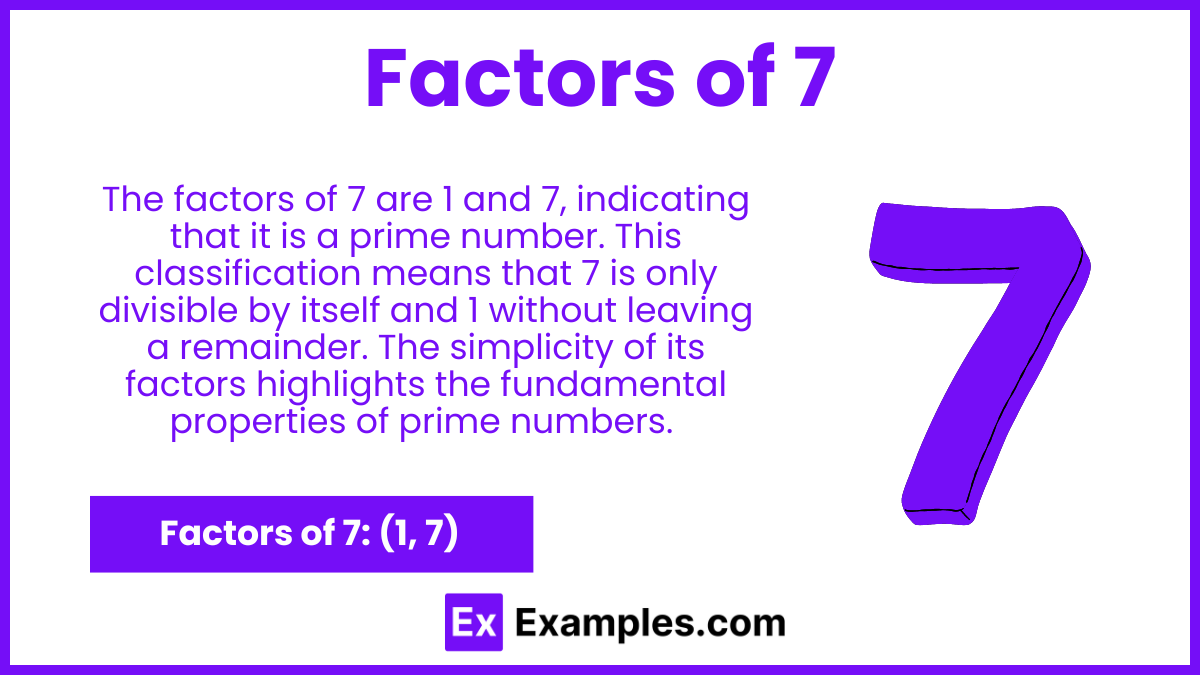Which of the following is a factor of 7?
2
3
4
5

The factors of 7 are the numbers that can divide 7 without leaving a remainder. Since 7 is a prime number, it has exactly two factors: 1 and 7. These factors are significant because they represent the only numbers that can evenly divide 7. Understanding the factors of 7 is essential in various mathematical concepts, including prime factorization, divisibility rules, and simplifying fractions. Additionally, the number 7 holds a special place in many cultures and contexts, from days of the week to wonders of the world. This guide will delve into the factors of 7, exploring their importance and applications in both mathematics and everyday life.

The factors of 7 are solely 1 and 7. As a prime number, 7’s uniqueness lies in its exclusive divisors, with no other integers dividing it without remainder. This prime property is crucial for understanding concepts like prime factorization and divisibility. Beyond mathematics, 7 holds cultural and symbolic significance, seen in the seven days of the week and the seven wonders of the world, underscoring its broad impact and importance.
Prime factorization is the process of breaking down a number into its prime components. Prime factors are the prime numbers that, when multiplied together, yield the original number. Understanding how to calculate the prime factors of a number is a fundamental skill in mathematics, especially useful in areas like number theory, cryptography, and computer science. In this guide, we’ll walk through the steps to calculate the prime factors of the number 7.
Prime factors of a number are the prime numbers that divide the number exactly without leaving a remainder.
Check if 7 is a prime number. A prime number is a number greater than 1 that has no divisors other than 1 and itself.
Identify all prime numbers less than 7 to check for divisibility. The prime numbers less than 7 are 2, 3, and 5.
Start checking from the smallest prime number:
Since 7 is not divisible by any prime number less than itself, it confirms that 7 is a prime number.
The prime factorization of 7 is 7 itself, as it is only divisible by 1 and 7.
7 can be divided by 1 without leaving a remainder (7 ÷ 1 = 7).
7 can be divided by itself without leaving a remainder (7 ÷ 7 = 1).
The factors of 7 are 1 and 7.
Divide 7 by 3: 7 ÷ 3 = 2.333 (not an integer).
3 is not a factor of 7.
Divide 7 by 1: 7 ÷ 1 = 7 (an integer).
1 is a factor of 7.
Divide 7 by 7: 7 ÷ 7 = 1 (an integer).
7 is a factor of 7.
Divide 7 by 2: 7 ÷ 2 = 3.5 (not an integer).
2 is not a factor of 7.
Understanding the factors of a number is fundamental in mathematics. When it comes to the number 7, it is essential to recognize its properties and how it interacts with other numbers. Here are some useful tips for understanding and working with the factors of 7:
Yes, 7 is a prime number. A prime number is a number greater than 1 that has no divisors other than 1 and itself.
The common factors of 7 and another number depend on the other number. For instance, the common factors of 7 and 14 are 1 and 7, while the common factors of 7 and 15 are only 1.
In factorization, 7 is used in prime factorization. Since 7 is a prime number, it can only be represented as 7 itself in a factorization expression.
The greatest common factor (GCF) of 7 and 21 is 7. This is because 7 is the largest number that divides both 7 and 21 without leaving a remainder.
Yes, the multiples of 7 are 7, 14, 21, 28, 35, 42, 49, 56, 63, 70, and so on. These are found by multiplying 7 by whole numbers (1, 2, 3, etc.).
The positive pair factors of 7 are (1, 7). These are the numbers that multiply together to give 7. The negative pair factors of 7 are (-1, -7). These negative numbers also multiply together to give 7, demonstrating that factors can be both positive and negative.
The factors of 7 are 1 and 7. Adding these factors together gives a sum of 8. This is calculated as follows: 1 + 7 = 8. Therefore, the sum of all the factors of 7 is 8.
Yes, 1 and 7 are the only factors of 7, making it a unique number with limited divisors due to its prime status.
Text prompt
Add Tone
10 Examples of Public speaking
20 Examples of Gas lighting
Which of the following is a factor of 7?
2
3
4
5
What is the smallest factor of 7?
1
3
5
7
Find the largest factor of 7.
1
2
7
14
What are the factors of 7?
1, 2, 3, 7
1, 7
1, 2, 7
1, 3, 7
Which of the following is not a factor of 7?
1
7
2
3
If you divide 7 by one of its factors, what will be the result?
7
8
9
10
Which of the following pairs includes factors of 7?
1 and 8
1 and 7
2 and 7
3 and 7
What is the result when you multiply all factors of 7 together?
7
14
49
1
Which number is not a factor of 7?
1
7
5
6
What is the quotient when 7 is divided by each of its factors?
7 and 1
1 and 7
7 and 0
7 and 2
Before you leave, take our quick quiz to enhance your learning!

